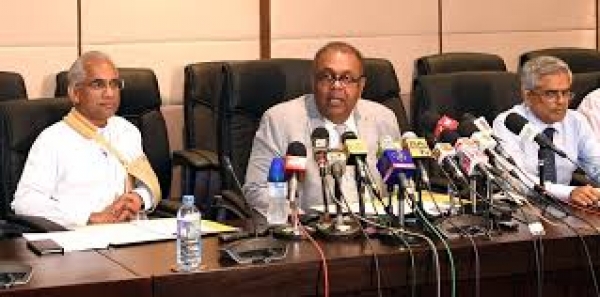Finance Minister Mangala Samaraweera today lashed out at SLPP Presidential candidate Gotabhaya Rajapaksa over the latter's remarks on Sri Lanka's international obligations, including the UNHRC resolution.
"Presidential Candidate of the SLPP, Gotabaya Rajapaksa, dismissed Sri Lanka’s commitments to our citizens on human rights, rule of law, and processes for truth-seeking, reparations, and guarantees of non-recurrence including Resolution 30/1," Samaraweera said, addressing a press conference in Colomno.
Samaraweera added, "He also dismissed the need to address the grievances of families from all parts of our country whose loved ones including security forces personnel are missing. With the arrogance of an authoritarian regent, he remarked that the “people in the North and East have more important issues: jobs, education, etc, and we can’t hang on to old things; we have to move forward”. By saying this, he claimed that he and he alone knows what is best for each and every individual citizen in this country including how they should think and feel including in the face of personal tragedy.
Listening to this, I thought that it is my duty to remind the citizens of our country about the history of how, during the Rajapaksa-era, we erred in dealing with our conflict-ridden past, isolating our country on the international stage and how we regained our stature following the January 2015 Presidential Election by reasserting our sovereign right to deal with our own issues locally.
As you would all remember, President Rajapaksa appointed the ‘Lessons Learnt and Reconciliation Commission’. Yet, implementation of its recommendations was ignored. Then, yet another Commission titled the ‘Presidential Commission to Investigate Complaints Regarding Missing Persons’ (Paranagama Commission) was appointed. This included a foreign Advisory Council comprising, among others, Rt. Hon. Sir Desmond de Silva QC (UK) and Professor David Crane (USA). There were also foreign experts supporting the Council including Mr. Rodney Dixon, QC. (UK/ South Africa), Professor Michael Newton (USA) Vanderbilt University who formerly served as the Senior Advisor to the United States Ambassador-at-Large for War Crimes, Commander William Fenrick (Canada), Professor Nina Jorgensen, Major General John Holmes, and Mr. Paul Mylvaganam (UK).
Non-implementation of recommendations of the Presidential Commissions appointed by President Mahinda Rajapaksa resulted in the erosion of trust and confidence resulting in a series of resolutions in the Human Rights Council on Promoting Reconciliation, Accountability and Human Rights in Sri Lanka in 2012, 2013, and 2014. Although Sri Lanka refused to participate in a dialogue with the co-sponsors and dissociated itself from these resolutions, they were adopted irrespective of Sri Lanka’s disassociation, and by 2014, the Council had set up an investigation on Sri Lanka called the OHCHR Investigation on Sri Lanka (OISL). This was the first ever international investigation on a human rights situation in our country.
By December 2014, Sri Lanka had become isolated on the international stage. Our security forces were deprived of peacekeeping opportunities and training opportunities in the developed countries of the world, naval ship visits from the developed countries of the world had ceased and so had joint exercises, EU GSP+ facility had been withdrawn, there was a ban on fish exports from Sri Lanka to the EU, IMF and World Bank had stopped lending to Sri Lanka, the economy was burdened by debt taken at commercial rates for vanity projects, the judiciary was in tatters with a weakened rule of law regime and the impeachment of the Chief Justice, investor confidence was at an all time low, and Sri Lanka’s stature on the international stage had eroded, and so had confidence, credibility and trust.
The Report of the OHCHR Investigation on Sri Lanka was due in March 2015, and further strictures including targeted measures on individuals were expected following the release of the Report.
It was in this backdrop that the Government, following the Presidential Election on 08 January 2015, based on the mandate received from the voters to implement the 100 Day Programme, presented its own proposals and co-sponsored Resolution 30/1 to regain and reassert Sri Lanka’s sovereign right to solve its own problems locally, so that space for any further international action or strictures would not be open. This was the path to establish durable peace and reconciliation in our country, restore Sri Lanka’s dignity on the international stage as a state that takes responsibility to address the problems of all sections of its own citizens, renew Sri Lanka’s engagement with the international community, rebuild eroded trust and confidence, restore the dignity of our security forces, police and judiciary, and usher in the sustained stability required for investor confidence and durable prosperity for all our citizens.
It is as a result of this resolution (30/1) that prospects for international action initiated through resolution 25/1 of March 2014 and the OISL (OHCHR Investigation on Sri Lanka) that was adopted during President Rajapaksa’s regime was effectively halted. It is important to remind everyone that it is only if we as a responsible and sovereign nation fail to act that we place our citizens in grave peril by allowing space for others to step in, and international action as well as universal jurisdiction to apply."










